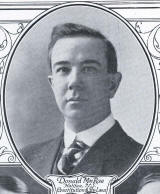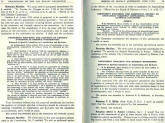|
“The advancement of international understanding, goodwill and peace
through a world fellowship of business and professional persons united
in the ideal of service.”
-The
Fourth Object of Rotary initially composed by
Donald MacRae.
Past District Governor Jim Angus
has recently engaged all in the Global
History Project in further examining Rotarian Donald MacRae. Jim has
argued with both knowledge and passion that Zone 22 covering Canada
acknowledge the massive impact Donald MacRae had on the Rotary movement
and introduce a
Donald MacRae Award
to be given annually at the Zone Institute to an individual or
association that made some significant contribution to international
understanding, goodwill and peace.
Jim has compiled a brief analysis on MacRae’s life and his impact on
Rotary which is reproduced below. It is pleasing to all at Rotary Global History, that we have not ignored Donald McRae’s
contribution to our movement.
John
Eberhard,
RID Zone22 2003-2005 is currently considering Jim’s request.
Canada,
Jim explains, was an obvious land in which to sow the seeds of Paul
Harris’s new vision: “If any group had an understanding of how
international organizations might operate, it was the Canadians with
their country’s long-time membership in the British Empire, now the
Commonwealth. Indeed, Canada belongs to more international organizations
than any other country – The Commonwealth, Francophonie, the Group of
Seven (G7), the UN and all its branches, NATO, OECD, OAS (Organization
of American States) SEATO (South East Asia Treaty Organization, APEC
(Asia Pacific Economic Cooperation), WTO (World Trade Organization),
NAFTA, and probably FTAA to name a few.”
In 1920,
Rotary International President Pete Snedocor appointed Donald MacRae, a
recognized expert legal draftsman, chair of the incoming Constitution
and By-laws Committee.
 He was born in the tiny village of Canoe Cove on Prince Edward Island on
13 June 1872. After graduating from high school, he worked in a
clothing store for seven years. In 1894, at the age of 22, he entered
Dalhousie University on a scholarship, graduating four years later with
high honours in classics and the University Medal. He next spent six
years at Cornell University, teaching Greek and earning an A.M. degree
in 1899 and a PhD in 1905. Between 1905 and 1909 he lectured in Greek at
Princeton University. In 1909 he returned to Canada to study law at
Osgoode Hall in Toronto, graduating in 1912 and being called to the bar
in 1913. After practising law for one year in Toronto, he accepted an
appointment as Dean of the Law School at Dalhousie University, a
position he held until 1924, when he returned to Osgoode Hall as a
full-time lecturer. He retired in 1944. He was born in the tiny village of Canoe Cove on Prince Edward Island on
13 June 1872. After graduating from high school, he worked in a
clothing store for seven years. In 1894, at the age of 22, he entered
Dalhousie University on a scholarship, graduating four years later with
high honours in classics and the University Medal. He next spent six
years at Cornell University, teaching Greek and earning an A.M. degree
in 1899 and a PhD in 1905. Between 1905 and 1909 he lectured in Greek at
Princeton University. In 1909 he returned to Canada to study law at
Osgoode Hall in Toronto, graduating in 1912 and being called to the bar
in 1913. After practising law for one year in Toronto, he accepted an
appointment as Dean of the Law School at Dalhousie University, a
position he held until 1924, when he returned to Osgoode Hall as a
full-time lecturer. He retired in 1944.
To return to his Rotary activity, MacRae presented a host of
constitutional amendments to the Edinburgh Convention. The most
significant one, which has had the greatest long-term effect on Rotary,
was a resolution adding the Fourth Object. Drafted by MacRae, himself,
it was approved earlier by the Board of Directors. The wording was
similar to the present wording:
“To aid in the advancement of
international peace and goodwill through a fellowship of business and
professional men of all nations united in the Rotary Ideal of Service.”
It is not surprising that MacRae should propose the fourth object of
Rotary which now reads: “The advancement of international
understanding, goodwill and peace through a world fellowship of business
and professional people united in the ideal of service.” He had been
thinking about it for a long time.
|
In an address to the International Convention in
Kansas City in 1918, while World
War 1 was still raging, MacRae outlined his philosophy of peace and
proposed that Rotary become an agent for the promotion of goodwill and
peace among nations - the first time this vision of Rotary was expressed
publicly.
In the Kansas City address, MacRae spoke of three kinds of peace
including the peace of primitive man (barbarism) and peace imposed by a
world power (imperialism).
But to him the most lasting kind of peace was what he called the
“peace of cooperation.” He defined it as “peace founded on
goodwill, on sympathy and trust, the peace of free play and fair play.”
He urged Rotarians to become involved in creating this kind of peace.
“Goodwill implies sympathy and sympathy and goodwill beget trust,” he
said. And then he added, “On these foundations then, on the foundation
of goodwill, sympathy, and trust, to which may we not add, to make it
four-square, the Rotarian spirit of service, must we believe, be erected
the structure of peace.”
MacRae ended his address with these remarks. “The ultimate and final
security of peace is to be found in individual hearts and minds.
The spirit of goodwill, the spirit of sympathy, the spirit of trust,
the spirit of service, the new sense of community of purpose, the
new sense of unity of life, these are things which must have their birth
and growth in the hearts and minds of individual men and women.”
MacRae mulled these sentiments over for three years as he devised a
strategy whereby the service ethic of Rotary could be used to create the
foundations on which international peace might be built. His
strategy was the Fourth Object of Rotary, which he, and he alone,
devised. It was fortuitous that he had been appointed chair of the
Constitution Committee when he was.
Before the
Edinburgh Convention, the object of
Rotary had been limited to domestic affairs. Other than its inclusion in
the name of the organization, the word “international” did not even
appear in the organization’s constitution or by-laws and not much of its
literature. “Service” meant “community service;” “fellowship” implied
only “club fellowship.” But MacRae’s fourth object would change all
that.
Rotarians’ commitment to “international understanding and peace” is what
distinguishes
 Rotary
from all other service clubs. Cliff Dochterman, a recent RI
president updated MacRae’s Fourth Object by explaining how Rotarians
promote peace. Dochterman wrote: Rotary
from all other service clubs. Cliff Dochterman, a recent RI
president updated MacRae’s Fourth Object by explaining how Rotarians
promote peace. Dochterman wrote:
“It is the conviction of Rotary International that the lasting peace
which the world seeks is built on friendship, tolerance, and goodwill
among people. Our instruments of peace are food, education, health care,
environmental improvements, respect for all persons, and many other
activities we call humanitarian service.”
And so The Fourth object was to become the engine that drives Rotary’s
international service; it has become the watchword of the Rotary
Foundation. All the marvellous international service programs in which
we participate can be traced to the Fourth Object – Youth exchange,
Group Study Exchange, World Community Service Projects, Scholarships,
Health Hunger and Humanity Projects, matching grants, peace forums, and
the magnificent PolioPlus program.
With thanks to RID 2003-2005 John
Eberhard & PDG Jim Angus
Calum Thomson,
Rotary Global History
Rotary Zone 22 Donald
MacRae Peace Award |








